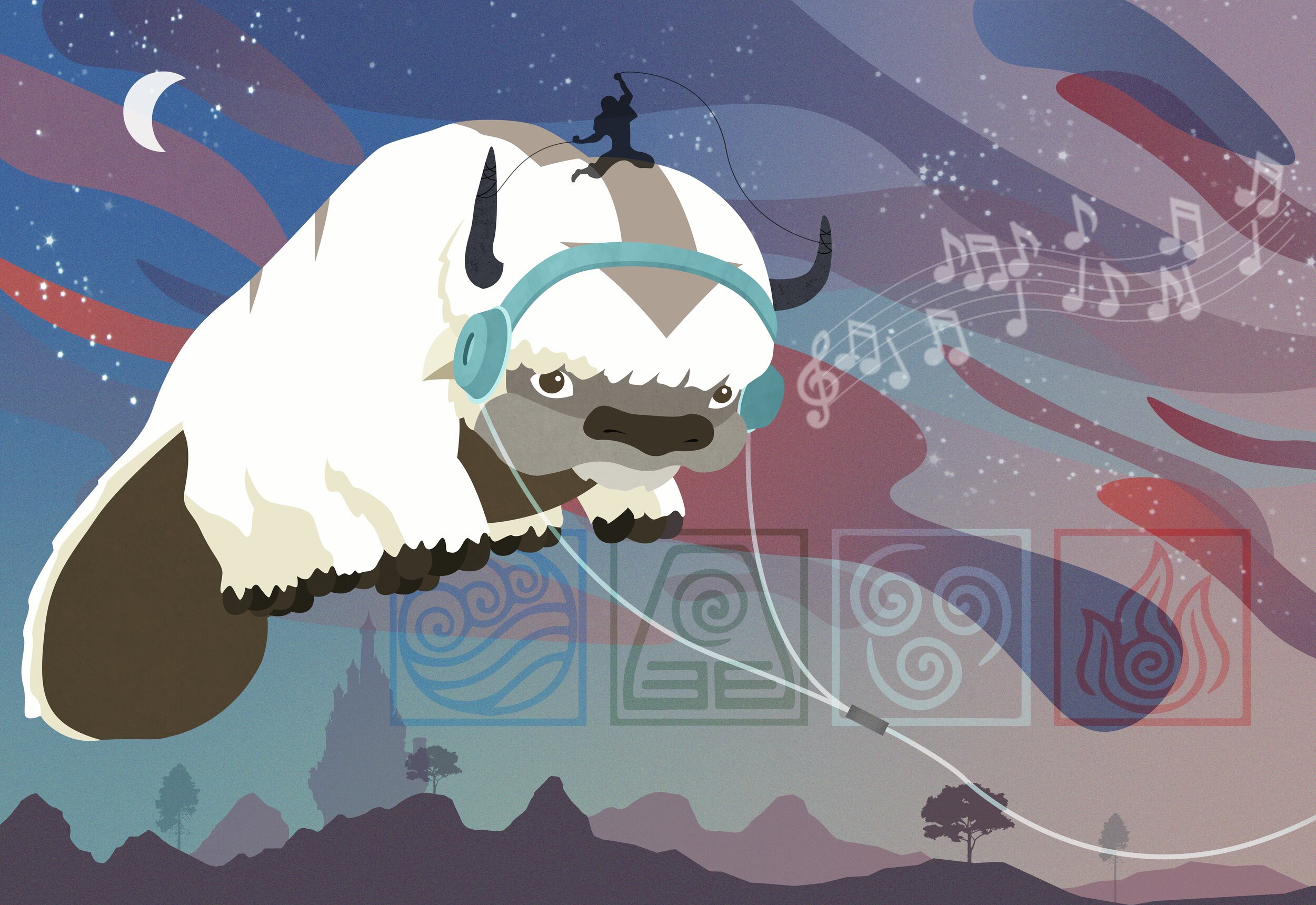Media and Music: The Soundtrack of “Avatar: The Last Airbender” In a New Age
The reemergence of the hit 2000s anime has generated new attention on the show’s grand soundtrack.
In Media and Music, our writers take a deep dive into how movies use scores and songs to engage viewers, give new meaning and tone to some of our favorite scenes, and establish themes. It almost goes without saying, but there are spoilers abound.
Written by Ilyanna Santos
Illustrated by Anisha Kamat
Over the summer, Netflix began streaming the 2005 hit anime “Avatar: The Last Airbender,” lifting the spirits of old fans and engaging a new era of viewers. The show centers around a young boy, Aang (Zach Tyler), who reawakens after a hundred years to find a war-torn world amongst the four nations where humans have the ability to bend the elements of water, earth, fire, and air. Aang is the Avatar: he can bend all four of the elements and must learn to do so to protect the world. Aang teams up with Katara (Mae Whitman) and Sokka (Jack De Sena), two members of the Southern Water Tribe, on a mission to defeat the villainous Fire Nation before it’s too late.
The show is most notable for its mature themes and intense character development while still retaining a light and fun plot suitable for children. Fans have grown to appreciate the creativity of the show for its unique take on the bending of the four elements, allowing the show to be a wondrous escape from the everyday (these days: the pandemic world). Compelling story arcs and character development aside, many have also grown attached to the show’s soundtrack.
Known for its instrumental tracks and occasional quirky lyrics, the soundtrack brings balance to the overall energy of the show. Whether you’re an old-time viewer or new to the fandom, we’ve gathered some of the best tracks from “Avatar: The Last Airbender” so you can pretend to waterbend with the right background music.
“Avatar Theme Song”
This song has many impactful components that distinguish it from others on the soundtrack. The cymbal clashes and the bright symphonic sounds make an early statement of the show’s grandeur, with the power of each striking note driving the message of Katara’s narration throughout each episode’s introduction. The track balances softer melodic sections with higher energy rhythmic and orchestral sections. The song’s harsh rhythmic phrases fused with the orchestra sound and simple ending allows for a grand commencement of each episode.
“Sokka’s Theme”
While most of the series’ soundtrack is rather serious, many lighter gems like “Sokka’s Theme” play during the show’s more comedic scenes. Sokka is a fun-loving, witty, sarcastic, and reasonable non-bender and Katara’s brother. The short track typically occurs throughout the series when Sokka thinks up a plan or idea. The instrumentation is more rhythmic and shorter than other songs from the show, shifting the tone from serious to playful For example, the song plays when Sokka tries to prove that an elderly fortune teller is untrustworthy, helping illustrate his funny strategic thinking.
“Leaves From The Vine”
In the more touching and fragile moments of the show, the accompanying songs are less aggressive and dramatic. Instead, songs such as “Leaves From The Vine” are soothing and appeal to the listener’s emotions. The song uses softer yet playful acoustic sounds such as a banjo to match the sweet and cheerful personality of Iroh, a former general for the villainous Fire Nation who has secretly turned to aid the resistance. The song also has a mellow tone, allowing viewers of the show to focus on Iroh’s emotional loss of his son. “Leaves From The Vine” is heard when Iroh is attempting to cheer up a young boy and later on when he is honoring his son, Lu Ten, on a hilltop.
“Last Agni Kai”
The dramatic introduction and symphonic sound of “The Last Agni Kai” fuel the brash and impulsive nature of the firebending duel, or Agni Kai, between Fire Nation royalty siblings Zuko and Azula. The song starts out on a contemplative note as Zuko and Azula blast each other with their fire and oversees a steady tempo with a percussion composition that reflects drums of war. The song continues in a slow and steady pace, while a string section plays repetitive phrases exuding a sense of sorrow and persistence. Then, towards the middle of the piece, there is a pause where the drums continue to play and the string section intensifies and builds its speed during which Zuko challenges Azula’s ability to defeat him with her blasts of lightning. The song then slows to a violin solo, which mirrors the slow sacrifice of Zuko to protect bystanding Katara from Azula’s deadly lightning. The song ends in a clashing and frantic string section, overlaying Zuko’s serious injury.
“The Avatar’s Love”
The final scene of the show displays a kiss between Aang and Katara, and “The Avatar’s Love” is the ideal song to go along with this moment. The instrumental song softly builds tension until a vibrant orchestral clash of sound occurs right at the moment of the kiss. The building tension of the song’s string section add a sense of grand significance to this long-awaited moment. “The Avatar’s Love” also uses soft marimba instrumentation played over the soothing string sections to add a mystical feeling to the romantic moment, creating a blissful final scene for the show.
Overall, the “Avatar: The Last Airbender” soundtrack is a strategically orchestrated compilation of songs with instrumentations inspiring intensity, playfulness, romance, and power throughout the show. The soundtrack is a key aspect of bringing the show to life and engages the audience into the world of “Avatar: The Last Airbender.”

